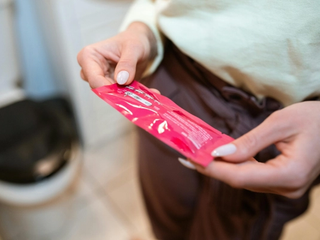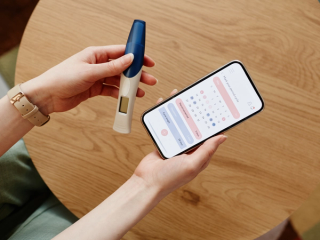
- Home
- Advice Hub
- Conception
- Fertility & Infertility
- Blocked Fallopian Tubes: Causes & Fertility Tips
Blocked Fallopian Tubes and its Impact on Fertility: Causes, Symptoms & Fertility Tips
Learn about blocked fallopian tubes, their causes, symptoms, fertility impact, and tips for support, including the importance of professional help.
What Are Fallopian Tubes?
What are the symptoms of blocked fallopian tubes?
What Causes Blocked Fallopian Tubes?
IVF and Blocked Fallopian Tubes: What You Should Know
Conception and Blocked Fallopian Tubes
What is an ectopic pregnancy?
Tips for Supporting Healthy Fallopian Tubes
Blocked Fallopian Tubes: Why Professional Support is Key
Conclusion
FAQs About Blocked Fallopian Tubes and Fertility
Blocked fallopian tubes are a common cause of infertility, affecting a woman's ability to conceive naturally. This article provides an informative overview of blocked fallopian tubes, their impact on fertility, general tips for reproductive health and what to do if you are concerned you may have blocked fallopian tubes.
What Are Fallopian Tubes?
Fallopian tubes are essential components of the female reproductive system. They are thin tubes that connect the ovaries to the uterus, allowing the egg to travel to meet the sperm for fertilisation. The fallopian tubes' functions include:
- Transporting the egg from the ovaries to the uterus.
- Serving as the site for fertilisation when sperm meets the egg.
- Facilitating the movement of fertilised egg to the uterus for implantation.
When these tubes are blocked, the process of fertilisation and implantation becomes challenging, leading to potential infertility concerns and increasing the risk of an ectopic pregnancy.
What are the symptoms of blocked fallopian tubes?
You may not know that you have a blocked fallopian tube and only find out when you start having fertility investigations, however common signs can include:
- Irregular menstrual cycles.
- Painful periods or ovulation.
- Difficulty conceiving.
- Unexplained pelvic pain.
If you are concerned about any of these signs and symptoms, consult your doctor for advice and further investigations.
What Causes Blocked Fallopian Tubes?
The common causes of blocked fallopian tubes include:
- Pelvic inflammatory disease (PID).
- Endometriosis.
- Previous pelvic surgery.
- Sexually transmitted infections (STIs).
- Anatomical abnormalities to the structure of the fallopian tubes.
Recognising risk factors and seeking advice and support from your doctor can help you manage your reproductive health effectively.
IVF and Blocked Fallopian Tubes: What You Should Know
For women with blocked fallopian tubes, IVF (in vitro fertilization) offers an alternative path to conception. Since IVF bypasses the fallopian tubes by fertilising the egg outside the body and implanting it directly into the uterus, it provides a viable option in creating a family for those affected by tubal blockages.
For more insights on fertility treatments, take a read of an article we have all about fertility treatments.
Conception and Blocked Fallopian Tubes
How does a blocked fallopian tube affect fertility? When one or both fallopian tubes are blocked, sperm cannot reach the egg, preventing natural conception. If only one tube is blocked, natural pregnancy is still possible, it just may take a little longer to conceive.
Alternative fertility options include:
- Surgical procedures to remove blockages such as a procedure performed using keyhole surgery called fallopian tube cannulation or hysteroscopic tubal cannulation. This is a straightforward procedure, however it is not always successful particularly if the blockage is severe
- IVF to bypass the blockage
- Removal of the blocked fallopian tube in some circumstances your doctor may advise removing the affected fallopian tube, to reduce the risk of ectopic pregnancy and increase the chances of conception with the remaining healthy tube.
What is an ectopic pregnancy?
An ectopic pregnancy occurs when a fertilised egg implants outside the uterus, most commonly in one of the fallopian tubes, however it may also occur elsewhere in the pelvis or of unknown origin. This type of pregnancy is sadly not viable and, although rare, can be life-threatening if left untreated, as the growing embryo can cause the fallopian tube to rupture, leading to severe internal bleeding.
Symptoms of an ectopic pregnancy can include one sided abdominal pain, vaginal bleeding or spotting, dizziness or fainting and shoulder tip pain. Since ectopic pregnancies can be dangerous, it's essential to seek immediate medical attention if experiencing symptoms.
Tips for Supporting Healthy Fallopian Tubes
Maintaining healthy fallopian tubes is crucial for reproductive success. General tips for promoting tubal health include:
- Practicing safe sex to prevent infections like pelvic inflammatory disease (PID).
- Avoid smoking as research shows a strong association between smoking and an increased risk of ectopic pregnancy
- Enjoying a healthy lifestyle, maintaining a healthy weight where possible and ensuring a diet rich in vitamins, minerals and antioxidants to support your reproductive health.
Read our guide for additional guidance on conception supporting vitamins .
Blocked Fallopian Tubes: Why Professional Support is Key
Seeking medical advice is crucial when dealing with blocked fallopian tubes. While some look for medicines or supplements for blocked fallopian tubes the evidence to support the effectiveness of this treatment is limited. Professional guidance ensures that the most suitable treatment options are explored based on your own individual circumstances and offers you much needed support to understand your options and next steps.
Conclusion
Blocked fallopian tubes can be a significant barrier to natural conception, but various treatment options and lifestyle changes can improve fertility outcomes.
Understanding the symptoms, causes, and potential solutions will empower you to seek appropriate medical guidance. Whether exploring surgical treatments, IVF, or preventive measures, professional support is essential in navigating fertility challenges. If you suspect or are worried about blocked fallopian tubes, take the time to talk about your concerns with your doctor. Your doctor will help you in identifying the next steps towards finding a tailored solution for your reproductive health.
FAQs About Blocked Fallopian Tubes and Fertility
You may not necessarily know that you have a blocked fallopian tube and only find out when you start having fertility investigations, however common signs can include:
- Irregular menstrual cycles.
- Painful periods or ovulation.
- Difficulty conceiving.
- Unexplained pelvic pain.
As all of these symptoms can occur due to other gynaecological conditions, speak to your doctor for further investigations to help you get the diagnosis and treatment you need.
Yes, many women will conceive with one blocked fallopian tube, it may just take a little longer. If, however, both your fallopian tubes are blocked, you may require help from your doctor to conceive. Options include:
- Surgery to remove blockages.
- Assisted reproductive technologies like IVF.
Women with one functioning tube may still conceive naturally. However, if both tubes are removed or blocked, IVF will offer you the chance of creating your family.












